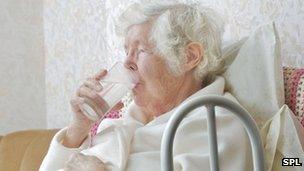Flawed NHS care 'leads to 12,000 kidney deaths a year'
- Published

Keeping patients hydrated is a simple way of preventing the condition
The quality of patient care in the NHS is once again under the spotlight as part of the investigation into complaints after deaths at Furness General Hospital.
In this week's Scrubbing Up, Prof Donal O'Donoghue, National Clinical Director for Kidney Care from 2007-2013, warns a simple-to-avoid kidney disorder is being missed leading to around 12,000 unnecessary deaths a year.
The recent "horrific" case of 100-year-old Lydia Spilner who died of dehydration in a Leicester hospital led Health Secretary Jeremy Hunt to call for a 'radical overhaul' of the NHS's patient safety approach.
This followed the government's newly appointed patient safety tsar, Prof Don Berwick, diagnosing an "enormous sickness" within the NHS, caused by a deteriorating culture of safety in the wake of the disturbing events at Mid Staffs.
Prof's Berwick patient safety group is expected to report in July on how the culture of the NHS and the care it provides can improve, and where not "a single injury" is tolerated.
Acute kidney injury (AKI) is one such "injury" - yet it it has a low profile, is poorly understood and also seriously under-prioritised within patient safety debates.
What may have gone unnoticed in Lydia Spilner's tragic case was that her ultimate cause of death was AKI.
AKI is the sudden loss of kidney function, which can easily develop in any sick person through infection such as pneumonia, diarrhoea or a heart attack.
Dehydration, and some commonly used medicines prime the kidney for an acute shut down.
'Conservative' estimate
For Lydia Spilner, just as for around one third of cases, AKI could have been prevented through the provision of basic clinical care.
That's as simple as making sure that patients are hydrated, medication is reviewed, and infections are treated promptly and reliably.
What is more, conservative estimates indicate that providing this care could prevent up to 12,000 deaths each year.
To help put these statistics in perspective, the numbers of preventable deaths from AKI is exactly 10 times the number of people that died in Mid Staffs, and works out at 32 people each day in the NHS.
AKI is clearly one of the major patient safety issues for the NHS.
It affects the vulnerable and leads to thousands of unnecessary deaths because of failings in care.
In spite of this, a report in 2009 from the National Confidential Enquiry into Patient Outcome and Death found that only half of patients with AKI had received 'good' care, with delays in diagnosis due to only a third receiving inadequate investigations.
A fifth of fatal cases were caused by drug prescribing errors.
'Zero harm' aim
Notwithstanding the need of addressing the human tragedy caused by AKI, there is clearly a practical reason for the government to focus on AKI.
It is about ensuring that some of the most vulnerable patients in the NHS are treated with dignity and respect.
We can therefore see AKI as the single measure which will tell us if we are making progress from the nadir of Mid Staffs.
Put simply, if we can get it right for AKI, we will get basic care right across the NHS.
To truly achieve a "zero harm" NHS, then the plans to tackle AKI and delivering good kidney care must be at the heart of the NHS patient safety approach.
Ensuring that healthcare professionals think of the kidney as a marker of good quality care and consider the risks of AKI as a matter of course, will drive exactly the care needed to make certain that patients are treated with dignity and respect.
Improving AKI treatment will therefore not only prevent many unnecessary and tragic deaths, but it will be the key to unlocking the culture shift that Hunt and Berwick are calling for and the NHS so clearly needs.